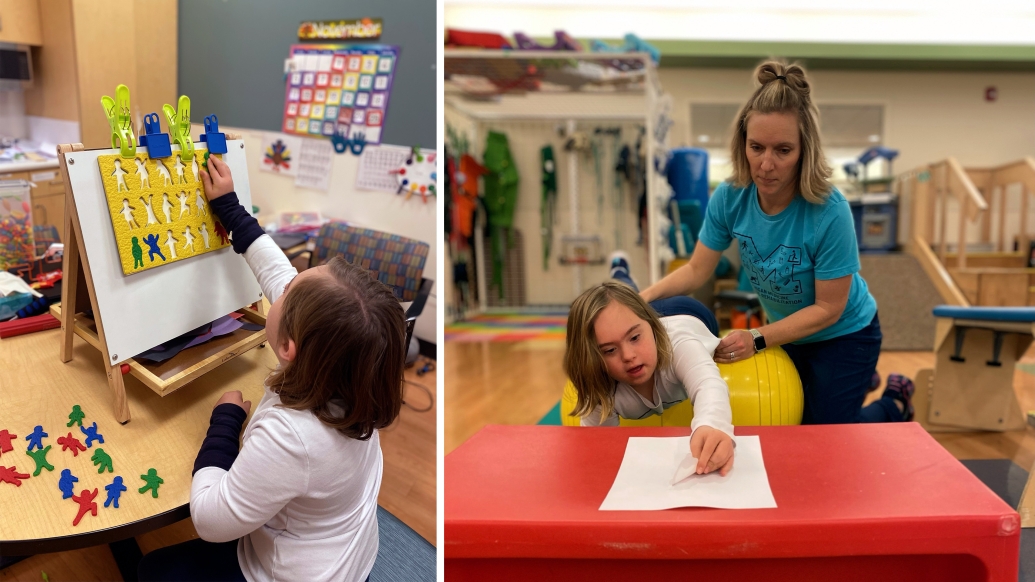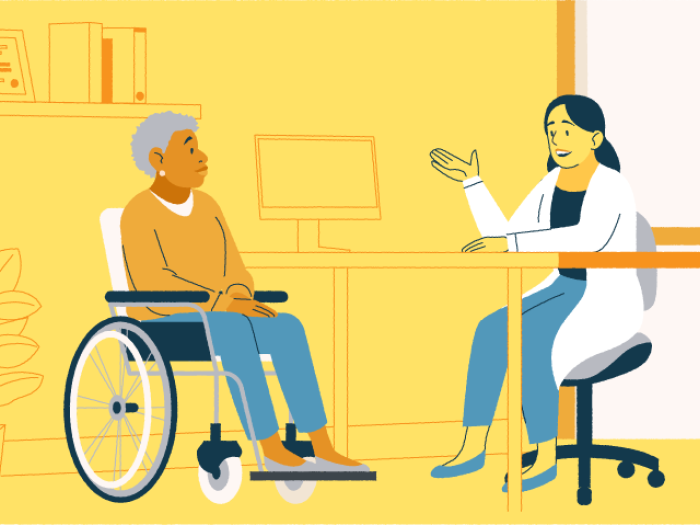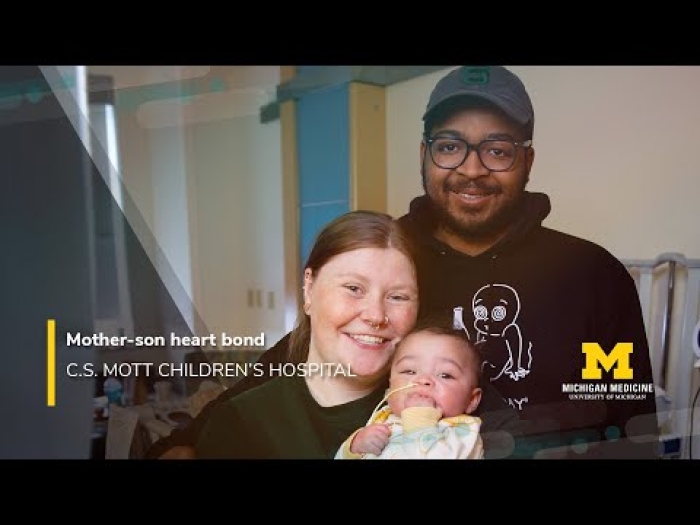After making a move across the country, mom found confidence in University of Michigan Health's care of her daughter
10:30 AM
Author |

Before the family’s move from North Carolina to Michigan, now 10-year-old Emma Hemrick fell and hit her head.
Hemrick appeared fine, but within 24 hours she had a seizure because of the injury.
Christine DeFroy rushed her daughter to the local hospital for treatment where she learned that Hemrick had suffered a traumatic brain injury that resulted in a hematoma and needed to be surgically removed in addition to a plate being placed in her head.
The treatments resulted in significant changes in Hemrick’s mobility for two months.
After putting their move on hold, the family later moved to Michigan and DeFroy turned to University of Michigan Health to help with Hemrick’s rehabilitation through play.
DeFroy was directed to the Milestones Pediatric Neuro Rehabilitation Program, of University of Michigan Health C.S. Mott Children's Hospital, and gave the center a call to see if she would be able to get Hemrick in for rehabilitation therapies.
It was important to DeFroy to find a place that could care for her daughter’s rehabilitation and take into consideration that Hemrick was born with Down Syndrome and would address the ways this would impact her treatment.
“Switching Emma’s medical care and moving was a daunting task, but I heard only positive reviews about Milestones,” said DeFroy.
“Within two weeks we were able to be seen and begin treatment. It was a weight lifted off my shoulders.”
Upon arrival to the program, Hemrick was introduced to a team of specialists to help her gain confidence in her ability to do daily tasks through playing.
DeFroy was impressed with how the clinic took the treatment of Hemrick’s injury head on.
Beginning treatment in a new state
The U-M Health Milestones Pediatric Neuro Rehabilitation Program specializes in evaluating and treating children with an acute neurological diagnosis from an injury or illness.
“Each case is specific to the individual,” said Marie Van Tubbergen, Ph.D., the program director of Milestones at U-M Health and pediatric clinical psychologist at Mott.
“It is important that each patient that comes into our program is assessed as a whole person to best meet their individual needs.”
The program assesses both the injury and the individual’s activities of daily living when creating the proper treatment plan.
Treatment plans include goals for children to adapt and learn strategies to return to activities they enjoyed prior to their injury or illness. Returning to school is also a key component.
Therapies often include play, music, sports, cooking, reading and writing, arts and crafts and games to make working on goals more fun and motivating depending on the child’s interests.
For Hemrick, one of these creative outlets is working on her cooking skills to not only help her enhance her fine motor skills, but also become confident in something she is passionate about.
She also enjoys playing matching games and creating crafts with her physical and occupational therapists to help increase her range of motion and stimulate brain activity.
“I’ve seen her gain so much confidence back since working with the Milestones,” said DeFroy.
“She says ‘I can’t’ less and is exploring the limits of what she can do in places such as the playground or at home.”
Hemrick saw a physical therapist, occupational therapist, a speech language pathologist and a rehabilitation neuropsychologist. She went to coordinated treatment appointments two to three times a week for several months.
Upon Hemrick’s recent discharge from the clinic, the team of rehabilitation specialists gave DeFroy material that she can continue work on at home to continue improving her skills.
Clear communication
For DeFroy, what helped solidify her trust in the program was the quick work of Diane DeVoogd, Milestones program case manager.
“It was clear from talking to Emma’s mom that she had a lot on her plate and many things to coordinate to make the transition from Emma’s current hospital to Michigan Medicine,” said DeVoogd.
“As the program case manager, I try to approach every family as if they were my own and assist in making the rehab journey just a bit easier by helping coordinate what I can, answer questions they have and point them in the right direction for things I can’t help them solve myself.”
DeVoogd’s quick work and assistance made transitioning Hemrick’s care to Michigan easier for DeFroy and gave her peace of mind when it came to her daughter’s care.
“It can be difficult to get in touch with a person on the other end of the line when you are working with healthcare,” said Van Tubbergen.
“Our program strives to make sure there is someone there to answer your questions and talk through your concerns whenever possible to help give you and your child the best care possible.”
The program works with the children’s teachers to make sure they understand the treatment they are getting and how this can be adapted to their daily activities in the classroom.
“Emma had not had the program work with her school before since we were so new to the area,” said DeFroy.
“It was comforting to know that we have a team of specialists on our side to make sure that Emma is receiving proper care inside and outside of the classroom.”
The Milestones team pulled together specific recommendations when Emma enrolled into a new school system, which helped her new school team understand her strengths and her needs.
The Milestones team makes comprehensive recommendations from all involved therapists when a child first returns to school after a neurological illness or injury. Often, these recommendations are updated in the following summer to reflect changes in how an illness or injury affect a child’s development.
Regaining confidence
Through her time at Milestones, DeFroy saw not only her daughter’s confidence come back, but also her personality.
DeFroy describes Hemrick as a “sour patch kid” who is sassy, active and loves Taylor Swift. She says that Hemrick has been brave and strong throughout the process and has worked hard with her team to achieve her goals.
Hemrick is constantly trying new things and building her confidence in different activities. Before her injury, she participated in gymnastics and is working on gaining the confidence to start again.
“Everyone at Milestones has been so helpful not only for Emma but for me as well,” said DeFroy.
“I can’t thank them enough for how they have helped Emma grow and the support they have given me.”
Sign up for Health Lab newsletters today. Get medical tips from top experts and learn about new scientific discoveries every week by subscribing to Health Lab’s two newsletters, Health & Wellness and Research & Innovation.
Sign up for the Health Lab Podcast: Add us on Spotify, Apple Podcasts or wherever you get you listen to your favorite shows.

Explore a variety of health care news & stories by visiting the Health Lab home page for more articles.

Department of Communication at Michigan Medicine

Want top health & research news weekly? Sign up for Health Lab’s newsletters today!





